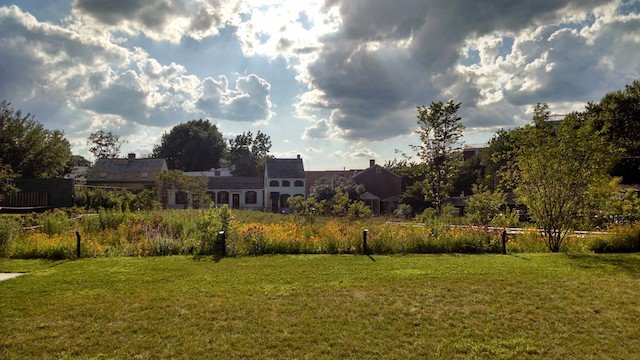Facing Closure, A Black Cultural Institution And Historical Site In Brooklyn Turns To Crowdfunding
May 9, 2019, 2:05 p.m.
The Crown Heights cultural institution has over the decades preserved an important piece of African American history.

The homes at Weeksville Heritage Center.
Despite flying under the mainstream radar, Weeksville Heritage Center in Crown Heights has over the decades preserved an important piece of African American history. Back in 1838, Weeksville was one of the largest free black communities in the state and among the largest in the country. After the abolition of slavery in New York, African Americans bought plots in the then-remote area as a way to secure voting rights and generational wealth. By the late 19th century, it had become a full-fledged town, with roughly 500 residents, comprised of ministers, teachers, the state’s first female African-American physician, and the city's first African-American police officer. One of the first African-American newspapers, The Freedman's Torchlight, was published in Weeksville.
Over the next several decades, European immigrants took over the community, most of the homes were razed and its history faded from memory. It was not until 1968, when a Pratt Institute historian named James Hurley led an excavation and research effort that helped resurrect four of the town’s original homes, known as the Hunterfly Road Houses, as well as an appreciation of Weeksville’s cultural and historical significance. In 2013, the center and all of its programming moved to a new $34 million 23,000-square-foot building.
That would have seemed to cement its presence, except now, Weeksville Heritage Center is struggling to stay afloat. The nonprofit, which has a $1.1 million budget, is facing a budget shortfall of $400,000. Last week, the staff launched a crowdfunding campaign to raise $200,000 by June 30. If the money isn't raised, the center's director says Weeksville will have to close its doors.
“We are heavily dependent on grants, and some didn’t come through,” Rob Fields, president and executive director at Weeksville Heritage Center, told Gothamist/WNYC.
As word of the center's financial woe spread, its supporters, among them prominent black writers and scholars, took to Twitter to urge people to donate.
so many people have moved to brooklyn and only taken from it. donating to the fundraiser to keep the historical site of weeksville, in crown heights, open, is one way to give back. if you have disposable income, it is your duty to give to this campaign: https://t.co/j3h8iLpxOx
— doreen st. félix (@dstfelix) May 8, 2019
@Weeksville's history is less known bc there's no white saviors in this story. This is about black people in Brooklyn organizing and advocating for themselves with radical self-sufficiency and self-reliance. And the story of Weeksville's rediscovery is just as radical...
— Kaitlyn Greenidge (@surlybassey) May 6, 2019
Please consider supporting @Weeksville to prevent their devastating closure this summer. Head to https://t.co/SnpjE03Fyk to protect this unique historic institution whose mission is to document, preserve, and interpret the history of free pre-Civil War Black communities. pic.twitter.com/1xxvE2E5Jv
— Brooklyn Museum (@brooklynmuseum) May 8, 2019
Over the decades, the center has managed to carve out a place in the community. In 2018, Weeksville welcomed over 14,000 visitors, and 6,000 of them were school-aged kids on field trips. The center provides a variety of artistic, cultural, and educational programming, largely centered on the Black American experience. On the second Saturday of every month, the museum hosts a free community day, which offers art workshops, tours of the Historic Hunterfly Road Houses, and live performances.
Listen to a segment by WNYC's Danny Lewis about the Weeksville Heritage Center:
“The work we’re supposed to be doing is working to document and preserve and share the inspiring history of this free black community," Fields said.
The center faces a hard road ahead. Even if the crowdfunding effort is successful, the long-term future of the center is still not guaranteed. Reaching the targeted amount of $200,000, which will go toward salaries and possibly maintenance costs, only means that the center remains open through September.
To date, nearly $81,000 has come through the crowdfunding effort.
Asked about the reason for the budget shortfall, Fields lamented the changes in today’s fundraising climate, noting, “We’re out of step to some degree with overall trends in the funding environment, and that makes it a little bit more challenging.”
Additional reporting by Danny Lewis.